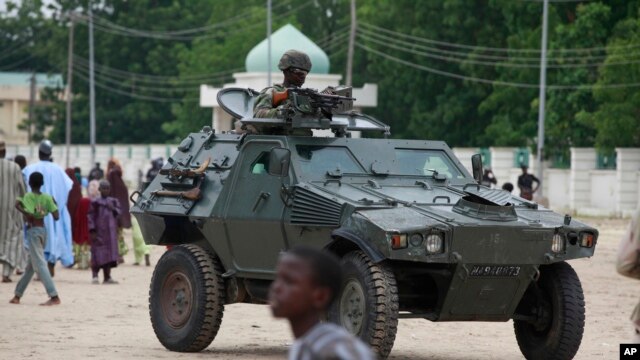Nigerians Face More Violence, Emergency Rule in Northeast

ABUJA — Violence has not abated in northeastern Nigeria despite the military’s efforts to quash the Islamist insurgent group Boko Haram. Officials say militants have been pushed out of urban areas, but attacks continue in the countryside. Some Nigerians also fear the militants are moving to areas outside the government’s emergency-rule zone.
At an Islamic school in the Nigerian state of Bauchi, children practice the Arabic alphabet.
Bauchi is not one of the three states where the government has imposed a state of emergency as part of efforts to crush Boko Haram.
But the children’s teacher says Bauchi residents are increasingly afraid of the four-year-old Boko Haram insurgency.
Boko Haram, he says, may claim to be an Islamist militant group fighting to impose it’s version of Islamic law, but with constantly changing tactics and increasing attacks on Muslim communities its hard to say what they really want.
“Who is the actual target? Who is hiding behind this umbrella? Actually this is what we have noticed with regards to these actions of Boko Haram,” said the teacher.
The teacher declined to give his name because of fears the militants will attack him.
This week, there were two attacks outside the security zones. In Bauchi, police say four officers were killed and one was wounded in a shootout Thursday night. Nasiru Mohammad, a witness, says he saw gunmen fleeing and bodies piled in a truck.
The attack was similar to the many hit-and-run attacks Boko Haram has carried out on authority figures over the past four years. The group is blamed for thousands of deaths in attacks on schools, churches, mosques, security forces, infrastructure and government buildings.
Before the recent government offensive, many of those attacks were in major northern cities like Maiduguri and Kano. In recent weeks, violence has moved to remote villages and roads in the northeast.
Thomas Hansen, senior Africa analyst at the security consulting firm Control Risks, says the militants are now targeting villages to prevent locals from supporting civilian vigilante groups operating with government support.
“I think what we’re seeing is that the civilian targeting of local communities has increased. And I think that’s been quite clear,” said Hansen.
Some analysts warn the government is alienating the public by shooting suspects rather than arresting them or locking them up for long periods of time without charges in inhumane, sometimes deadly, conditions.
This is John Campbell, a former U.S. ambassador to Nigeria and senior fellow at the Council on Foreign Relations:
“The government’s heavy-handed brutal approach, if anything, tends to drive public support to Boko Haram. Absolutely counter-productive,” said Campbell.
But Campbell says, in his opinion, there is a way to end the conflict.
“The approach should be one that address northern alienation from the government in Abuja, reaches out to the people in the north, embarks on certain highly visible programs or projects to address the pervasive poverty in the region, the collapse of education, and the almost complete non-existence of medical services,” he said.
Back in Bauchi, another analyst – a university lecturer that did not want to use his name to protect his safety – is less hopeful, saying anti-poverty measures may increase support for the government, but Boko Haram’s extreme religious beliefs should not be underestimated.
“The government resorted to using force, and force cannot kill spirit. That is their objective so the war, it is an endless war. Only God will take care of it,” said the lecturer.
On Wednesday, Nigerian lawmakers approved a six-month extension of the state of emergency in Borno, Yobe and Adamawa states.
Ardo Hazzad contributed to this report from Bauchi.
Source: VOANews
0 comments:
Post a Comment
Do you have any comment on this post. Write it and Share you opinion about it.
Sharing is Caring..Share the post :)